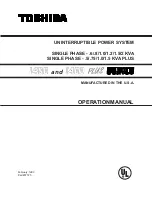
g
GE
OPM_SGS_ISG_10K_40K_0US_V010.doc
12/45
Installation
Guide
SG Series
10, 20, 30 & 40 kVA
3.2 DELIVERY
When delivered, inspect the
package integrity
and
the physical conditions of the
cabinets
carefully
.
In case of any damage sustained during transport, immediately inform the carrier and contact
your local
Service Center
.
A
detailed report
of the damage is necessary for any insurance claim.
A DAMAGED UPS MUST NEVER BE INSTALLED OR CONNECTED TO
UTILITY OR BATTERY!
3.3 STORAGE
3.3.1 Storage of the UPS
The UPS is carefully packed for transport and storage so that it is in perfect condition when
installed.
Never leave a UPS outside the building and don’t store other packages on the top of the
UPS.
It is advisable to store the UPS in its original package in a
dry, dust-free room, away from
chemical substances, and with a temperature range not exceeding
-13°F
(-25°C) to
131°F
(55°C).
Some important functions of the UPS, such as the customized functions, are defined by
parameters stored in a RAM memory.
A small backup battery located on the Control Unit board supplies the RAM.
If the storage time of the UPS exceeds
1 year
, these functions
should be verified
by an
authorized
Service Center
before putting the UPS into operation.
3.3.2 Storage of battery
When the delivery includes a maintenance free battery, keep in mind that they are subject to
self-discharge and therefore you must recharge the battery.
The storage time without battery recharge depends on the temperature of the storage site.
The optimal temperature for battery storage is
68°F
(20°C)
to
77°F
(25°C).
Recharge stored maintenance free battery every:
6 months when the storage temperature is 68°F (20°C)
3 months when the storage temperature is 86°F (30°C)
2 months when the storage temperature is 95°F (35°C)













































